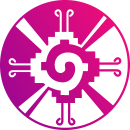-
Dis-Adjustered
(dis uh juhs' ter d)
Upon death the Thought Adjuster temporarily loses personality, but not identity; the human subject temporarily loses identity, but not personality; on the mansion worlds both reunite in eternal manifestation.
-
Disciples
(dih sahy puhlz)
The term apostle was employed to distinguish the chosen family of Jesus’ advisers from the vast multitude of believing disciples who subsequently followed him.
-
Dispensation
(dis puhn sey' shuhn)
A new epochal period.
-
Dispensational classes
(dis puhn sey' shuhn ul klahs ez)
Groups of sleeping survivors.
-
Dissociators
(dis uh soh' see yet urs)
One of the groups consituting the Master Physical Controllers .
-
Dium
(dee' uhm)
A city in the Decapolis.
-
Dives
(dahyvs)
Rich man in Nazarite allegory.
-
Divine
(dih vahyn')
Deity is the source of all that which is divine. Deity is characteristically and invariably divine, but all that which is divine is not necessarily Deity, though it will be co-ordinated with Deity and will tend towards some phase of unity with Deity — spiritual, mindal, or personal.
-
Divine Counselors
(dih vahyn' koun' suh lerz)
One of the groups of the Stationary Sons of the Trinity, beings partaking of the Trinity nature of the united Father, Son, and Spirit.
-
Divinington
(dih vin' ing ton)
One of seven sacred satellite spheres of the Father in circuit around Paradise. This world is the Paradise rendezvous of Thought Adjusters.
-
Divinity
(dih vin' i tee)
The characteristic, unifying, and co-ordinating quality of Deity, creature comprehensible as truth, beauty, and goodness; correlated in personality as love, mercy, and ministry; disclosed on impersonal levels as justice, power, and sovereignty.
-
Dorcas
(dawr' kuhs)
Believer at Joppa.
-
Dravidian
(druh vid' ee uhn)
The blending of the Andite conquerors of India with the native stock eventually resulted in that mixed people which has been called Dravidian.
-
Dual-origin beings
(doo' uhl awr' i jin bee ings)
Those of origin in any two of the Paradise Deities or otherwise created by any two beings of direct or indirect descent from the Paradise Deities.
-
Dualism
(doo' uh liz uhm)
The doctrine of good and bad spirits .
-
Dualities
(doo al i tees)
The Universal Father is one, but to time-space he is revealed in the dual phenomena of pure energy and pure spirit.
-
Dyaks
(dahy' ak)
A modern-day group that has evolved only the most primitive religious practices.
-
Dyaus Pitar
(dyous peh' tar)
Lord of heaven in Vedic cult.
-
Dyaus-Zeus
(dyous zoos)
Head of Greek pantheon.
-
Ebal
(ee' bahl)
Location of the traditions of Abraham, Jacob, and Abimelech.
-
Eber
(ee' bur)
An officer of the Sanhedrin who, when sent to arrest Jesus after his first temple talk, refused to do so.
-
Ebullition
(eb uh lish' uhn)
Worship.
-
Eden
(eed' n)
The planetary headquarters of such an Adam and Eve is usually denominated the Garden of Eden.
-
Edentia
(ee dehnt' sha)
The headquarters world of Norlatiadek, the constellation to which our system belongs.
-
Edrei
(en' dree)
One of the cities of the Decapolis.
